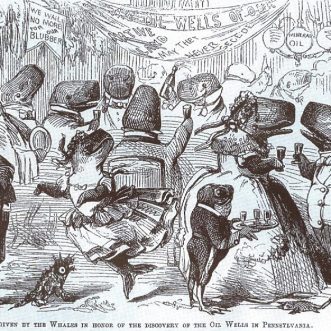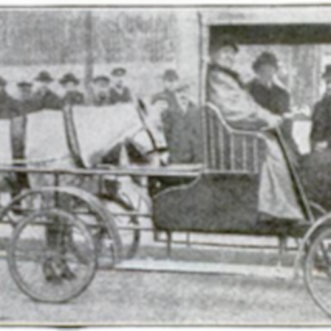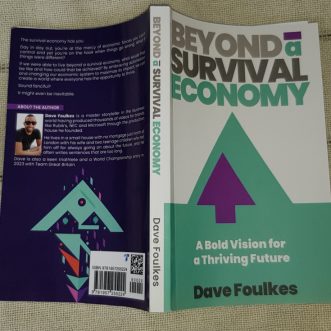July 11, 2023
I loved this reminder from @Jason Fried this morning, that your main ‘competitor’ is your own profitability.
And that put me in mind of the kind of tragedy I see played out over and over again with amazing small businesses. Tragedy that could be avoided with the right kind of attention to detail at the beginning.
As Fried says, as long as you are profitable, you are winning.
For me, the best way to be sure you are profitable, is to know that every single thing you sell is profitable in it’s own right, every time you sell it.
And I mean truly profitable, net profitable, after all costs have been accounted for.
Here’s how to work that out:
Let’s say I make beautiful sourdough bread, 20 loaves a day for 20 lucky subscribers who pick up daily.
First there’s the obvious costs of ingredients:
I buy these in different quantities, so I split each quantity into the number of loaves I will get from it:
- 10kg of heritage wholewheat flour at £27 (including postage) gives me 20 loaves at a cost of £1.35 per loaf
- 25kg of sea salt at £20.95 will season 1923 loaves, at a cost of 1p per loaf
- 10l of water at 14p per litre, will make 20 loaves at 7p per loaf.
I use 100g of sourdough starter for each loaf, made up of 50g rye flour and 50ml water.
- 25kg of rye flour at £34 (including postage) will start 500 loaves at 6.8p per loaf.
- A litre of water at 14p will start my 20 loaves at 0.7p per loaf.
So far then, the ingredients for my sourdough loaf cost me 1.35+ 0.01 + 0.068 + 0.077 = £1.51
But I haven’t allocated all my costs yet:
- Wastewater – for every litre I use baking, I use about 900ml in washing up. At 90p per litre this means 81p in total, or 4p per loaf.
- There’s a fixed charge for water and wastewater of 6p and 18p per day respectively, so 24p per day, or 1.2p per loaf.
- Obviously I cook my loaves, so there will be fuel costs. I use an electric fan oven, and cook my bread for an hour, so that comes to about 45p per batch of 4 loaves, or 12p per loaf.
That takes us up to 1.51 + 0.04 + 0.012 + 12 = £1.69 per loaf.
And I still haven’t allocated all my costs:
I bake my loaves on trays lined with parchment paper, 2 loaves per tray
- 10m of parchment paper at £1.45 will do 28 trays, or 56 loaves, so comes to 3p per loaf.
- My 2 aluminium baking trays cost me £13.50 each, and will last me at least 5 years. At 200 baking days a year, with 20 loaves per day, that comes to 20,000 loaves, or 0.135p per loaf.
- The 8 bannetons I prove my bread in cost me £11.39 each and likewise should last me 5 years. That adds about 0.5p per loaf.
- I mix my dough in a couple of 12l stainless steel bowls, at £21.99 each. That adds another 0.22p per loaf.
- My dough scraper cost £1.20 and should last me 2 years, which adds 0.15p per loaf.
- I invested in 2 heat-resistant oven gloves with fingers at £13.99 each. That adds another 0.014p per loaf.
These are tiny amounts, but together, add another 4.2p per loaf.
We’re now up to £1.73 per loaf.
And I still have to add costs for maintaining my sourdough starter (feeding it, keeping it somewhere where it can grow); cleaning up (washing up liquid, wipes etc.); wrapping the loaves (paper or paper bags); selling the loaves (point of sale system subscription or commission, website, marketing (even something as simple as an A board costs money, uses chalks and wears out); heating and/or lighting my kitchen; wear and tear on my worksurfaces etc., etc.
Let’s say that adds another 5p per loaf.
And finally my time. Which I work out by looking at how much I would have to pay someone else to do it – this is pretty much the minimum wage at the moment, so I decide to pay myself the same for now £10.18 per hour. My 20 loaves a day takes a total of 4 hours to make, bake, and wrap. So that’s £2.04 a loaf.
So now we’re up to £3.82 per loaf.
I do this in my own kitchen at the moment, so there’s no rent. But it’s worth pretending that there is rent to pay right from the off. So I look up how much it would cost to hire a dark kitchen. I can find a 170 sq ft one on Bermondsey for £2,600 per month ex VAT. My own kitchen is half that size, so I halve that figure. I only use it for half a day too, so I halve that again, to get a notional rent of £650 per month.
Divided among my 430 loaves a month, that adds £1.51 per loaf.
So my final total cost per loaf is £5.33
Now I need to add a profit to that.
I know I’ve covered all my costs per loaf, so I can experiment with this, to see what my market will bear.
Whether it’s 30p or 70p or £1.70 per loaf, what matters is that I know it’s all profit.
And that profit margin will only increase as I increase production, buy in more bulk, and spread my fixed costs across more loaves – until I have to rent a bigger kitchen, when it would pay to go through this exercise again.
Doing this exercise in such excruciateing detail is undoubtedly a faff.
But it pays off.
Because by the end of it you have a complete and intimate understanding of what it actually costs you to make the thing you make (whether that’s a product or a service), and that means you can charge the right profitable price for it from the very beginning.
If you don’t – and I’ve seen too many small businesses do this – growth turns into tragedy, because all you’re doing is losing money faster. Chasing sales, when what matters is profit.
Bake profit into each and every item you sell and you can relax, knowing that your profitability gets better as you grow.
That way you can be sure of being around to keep the promises you make to the people you seek to serve for as long as they want you.
Discipline makes Daring possible.









